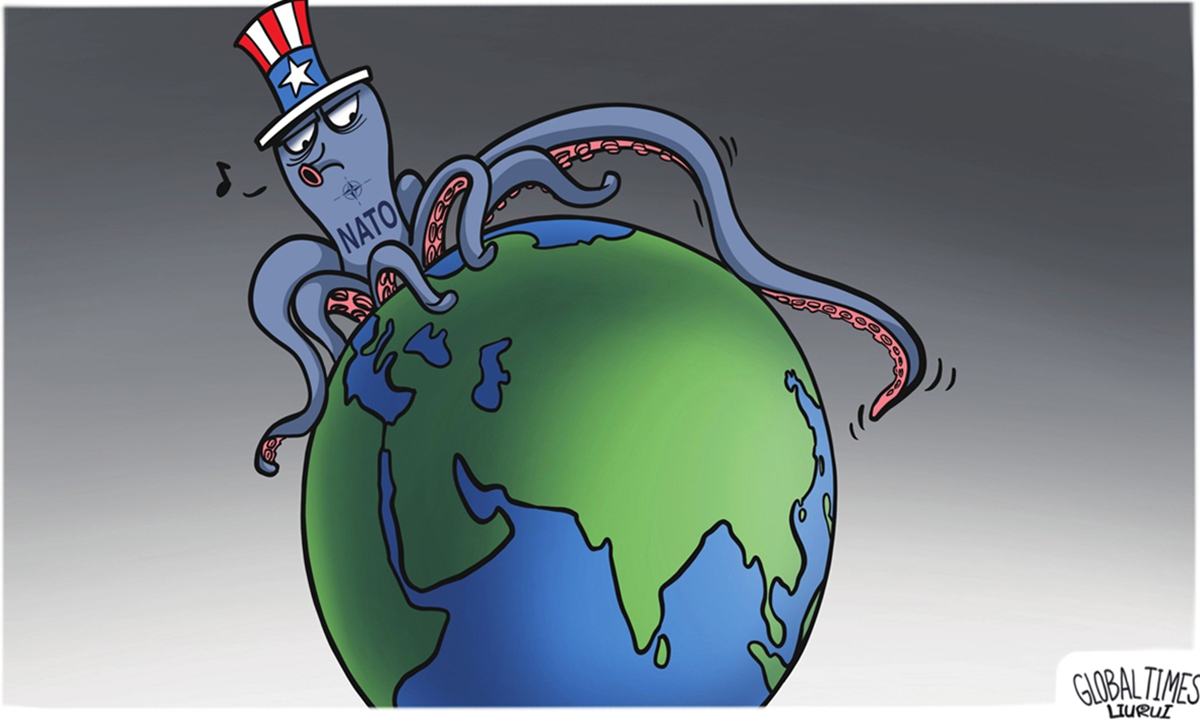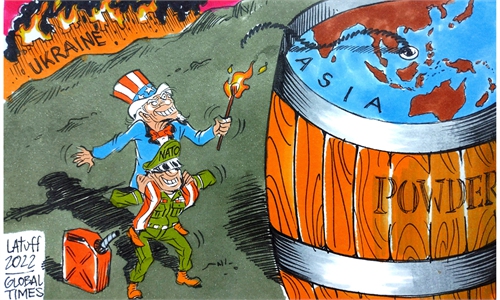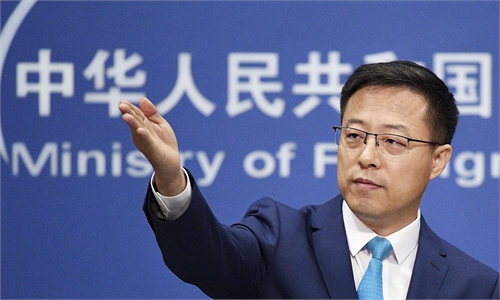
Illustration: Liu Rui/GT
Taking advantage of the heat of the Russia-Ukraine conflict, NATO intends to reframe the NATO Summit at the end of June as an opportunity to overstep the bounds of its normal range. In addition to the 30 member states, nonmembers are invited to participate the summit including Sweden and Finland which are interested in joining the organization, and "partners" far away in the Asia-Pacific such as Japan, South Korea, Australia and New Zealand. Following the expansion into Eastern Europe soon after the end of the Cold War, and its involvement in the War in Afghanistan, NATO is eager to take the Russia-Ukraine conflict as an opportunity to globalize the organization.In addition to the core of transatlantic relations, NATO has painstakingly developed a set of "partnership networks" over the years, successively extending its tentacles to Eurasia with the Partnership for Peace, to the Middle East and North Africa with the Mediterranean Dialogue, and to the Gulf region with the Istanbul Cooperation Initiative. Those networks have been the main tools for NATO to expand beyond Europe and infiltrate into non-military security areas, as well as the main leverage to fulfill its "globalization."
In constructing and promoting the partnerships, NATO has carefully planned and deployed a cross-border strategy. First, NATO starts with regional security issues and gradually breaks through the geographical boundaries through dialogue with its neighboring countries, penetrating into the surrounding Eurasian interior and the southern shore of the Mediterranean. Second, unsatisfied with playing a role only in a corner of Europe, NATO wishes to further break through the geographical limitations through cross-border issues. Since the end of the Cold War, NATO has been upgrading its position by generalizing the concept of security, drawing in countries that are geographically separate form NATO but geopolitically vital to constructing a cross-regional network. Apart from traditional security, NATO's current strategic aspects has covered the oceans, cyberspace, space, counter-terrorism, climate and even investment, infrastructure and other areas, with the help of which NATO could enlarge the network.
NATO is not satisfied with the current scale of its network, and desires to involve more countries which can be used as NATO's tool of expansion. This demands firm ties, and the tool NATO has found for this purpose is "politicization," which is one of NATO's reforming direction together with another direction of "globalization" almost simultaneously proposed. The core is to forge NATO into a reliable tool for exporting Western values, institutions and security concepts. Over recent years, uniting countries with similar values has been a priority principle through NATO's network of partnerships, thus NATO is ratcheting up enthusiasm and attention to some Asia-Pacific countries in its network, and there is a trend to develop them from "partners" to "allies."
Regardless of the security environment, regional pattern or strategic culture, NATO has nothing to do with the Asia-Pacific, as the latter with diverse regional political ecology is not the main battlefield of the Cold War and has been profoundly influenced by the Non-Aligned Movement. There are no historical genes or realistic need for bloc confrontation in this region. However, for US strategic needs, NATO is trying to activate and enhance its "partnership network" to participate in security affairs of the Asia-Pacific, therefore transforming the regional security structure.
NATO has found two reasons for its involvement in the Asia-Pacific. The first is to make full use of some regional countries' one-sided perception of the Russia-Ukraine conflict to revive the cliché of "a strong country must hegemonize, and it's necessary to defend democracy." The rhetoric of "today's Russia is tomorrow's China" is used to raise tension and intimidate regional countries, creating a demand for "NATO-style collective security" in the Asia-Pacific. The second is misappropriating the principle of indivisible security to produce specious theories like "the indivisible security of Europe and Asia," while the lessons of failure have been used as successful experiences to preach to Asia. With the spreading of such rhetoric, NATO released a dangerous signal with its attempt to develop partnerships in the Asia-Pacific into solid measures, thus destroying the regional security ecology.
If collective security is defined as winning in bloc confrontation, then NATO can call its siege of Russia as a success. But if one considers the essence of regional security is peace, then the Russia-Ukraine conflict and the reignited war in Europe is a definite failure. Collective security that is exclusive and confrontational will only lead to more conflict and fear in the Asia-Pacific, and the "success" of collective security comes at the cost of the "failure" of regional security. There is no reason for Asia-Pacific countries to accept the preaching and seduction of a serial loser.
The author is director of the Department of European Studies at the China Institute of International Studies. opinion@globaltimes.com.cn



